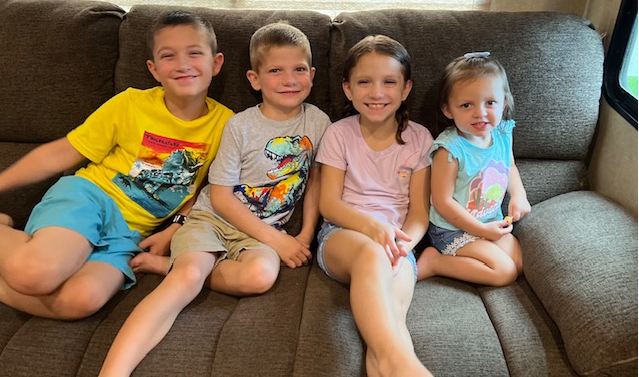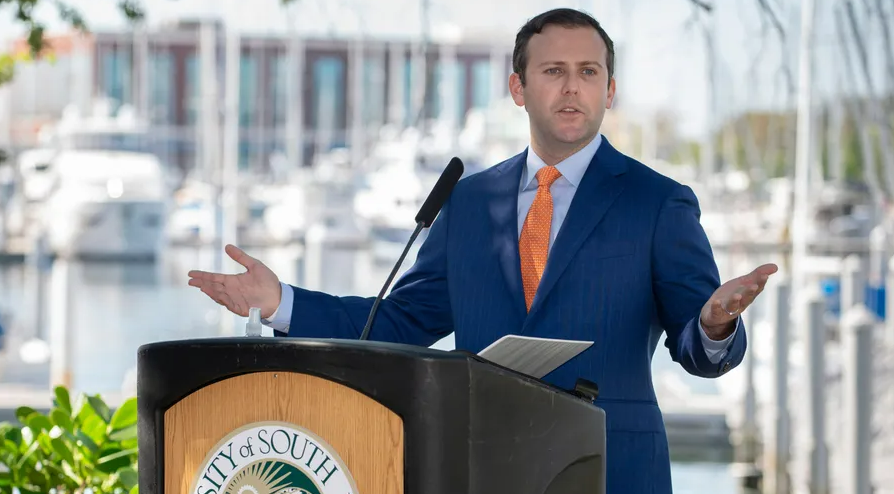
The Creighton children have developed a love of reading thanks to the New Worlds Reading Initiative, a program created and funded through the Florida Legislature in 2021 that distributes one free book per month during the school year to qualified students enrolled in the state’s district and charter schools.
Tamra Creighton’s kids love books.
“After school, we do a little bit of reading and then before bed,” said Creighton, a mom to seven children ranging in age from 10 years to 10 months. “During the summer we’re on trips, we read in the car to and from or inside the RV. Each one would pack a bag, and that was their to-do thing while we were out and about.”
Her husband is a lineman who travels to work for different utilities, and the family sometimes travels with him. The books provide a fun activity that helps boost the children’s reading skills.
Three of Creighton’s children, Mason, 10, Zoe, 8 and Boston, 7, found an extra reason to be excited about books after enrolling in the state’s New Worlds Reading Initiative last year. The program, created and funded through state legislation in 2021 and championed by House Speaker Chris Sprowls, R-Palm Harbor, distributes one free book per month during the school year to qualified children in kindergarten through fifth grade enrolled in Florida district and charter schools.
The University of Florida Lastinger Center for Learning is administering the program, which is funded by a $200 million appropriate in the 2021 state budget as well as a corporate tax-credit program that provides a dolloar-for-dollar return in tax credits for a corporation’s donation. Lastinger is partnering with Scholastic to distribute the books to each student.
Books are available in English, Spanish and Haitian Creole. Kids get to choose the topic of books they receive. Shaunté Duggins, assistant director of the New Worlds Reading Initiative, said the most poplar topics are adventure and humor.
Creighton appreciates the diversity of subject matter; her daughter loves books about the arts, while Mason enjoys mysteries. Boston prefers nature-themed books, especially those about sharks and dolphins.
The kids were recommended for the program after moving from Columbia County to Lafayette County. Their former schools offered the Accelerated Reader program, which incentivized reading and engaged them with quizzes and reward points for reading more books.
Their new schools did not offer the program, and the children’s engagement began to slip as a result. Boston, the 7-year-old, has trouble remembering what he reads and struggled in first grade. So, their teachers invited Creighton to sign them up for New Worlds Reading Initiative.
Creighton says the program has made a positive difference.
“Boston has really benefitted the most,” she said.
Each child’s books arrive at different times, and every delivery excites all of them. Each child has used the books to start a personal library, which is one of the goals of the program.
Duggins, reflecting on reading’s ability to transform lives in incredible ways as reading proficiency supports and promotes learning in all subjects, said teachers are important ambassadors of the program.
“They share our mission in instilling a love for reading within students and helping them read on grade level,” she said. “We are absolutely thrilled to partner with educators, families, and communities to deliver books to the homes of over 100,000 families to help instill a lifelong love of reading.”
As of July 13, the program had enrolled 161,000 families according to the Florida Department of Education. But Duggins said the program is only at its inception.
“We're working hard to ensure that every eligible child across the state of Florida has the chance to enroll," she said.
The book distribution system joins another statewide program available to enhance literacy skills for struggling young readers who attend district and charter schools. The New Worlds Reading Scholarship Accounts program, formerly known as the Reading Scholarship, provides $500 per student. Created in 2018, the program allows funds to be spent on tuition and fees related to part-time tutoring, summer and after-school literacy programs, instructional materials (including desktop/laptop computers and tablets and curriculum related to reading or literacy.
Step Up For Students, which hosts this blog, administers the New Worlds Reading Accounts program.

Outlined in HB 3, the New Worlds Reading Initiative and other literacy programs were part of Florida House Speaker Chris Sprowls’ legislative agenda, which included HB 7045, the largest expansion of a school choice program in the nation.
Editor’s note: Families can check eligibility requirements for the New Worlds Reading Initiative and enroll their children at newworldsreading.com. To read more about what Florida legislator Chris Spowls has to say about the program, click here.
A $200 million effort approved in 2021 by the Florida Legislature already has shipped nearly 336,000 free books to elementary school students in the state, making good on a promise to deliver a new book every month to children who need to boost reading skills.
The state’s New Worlds Reading Initiative, signed into law last June, is the first statewide book delivery service for Florida’s struggling early readers. Students who are reading below grade level at both traditional district schools and district charter schools are eligible.
Families can choose books at their child’s grade level from several genres including humor, adventure, art history and science. Books are available in English, Spanish, Haitian Creole, Braille and large print. Each month’s delivery includes support materials for parents.
The program was proposed by Florida House Speaker Chris Sprowls, R-Palm Harbor, as a way to encourage students to read at home and to help build home libraries for families who cannot afford to buy books. Outlined in HB 3, it aligned with Sprowls’ legislative agenda, which included HB 7045, the largest expansion of a school choice program in the nation.
“We cannot overstate the profound impact teaching a child to read will have on their future success,” Sprowls said while promoting the program at an event last summer. “Not only do we open them up to new worlds and ideas, we give them the tools to expand their imagination, foster their curiosity and ultimately chart their own destiny.”
More than 100,000 students have enrolled in the program so far, but state officials say more than 500,000 may be eligible. That estimate is based on 2021 reading scores on the state’s standardized test, where 45% of third graders scored below grade level in reading.
To help meet the demand, the Lastinger Center for Learning at the University of Florida, a national education innovation hub whose stated mission is to create educational systems where every child and educator experiences high quality learning regardless of life circumstances, is administering the New Worlds Reading Initiative.
We know what we need to do to support kids as readers,” said Shaunte Duggins, assistant director of the program at the Lastinger Center. “This is part of that puzzle.”
Duggins and her team spent months preparing for the program launch, conducting interviews and focus groups across the state with stakeholder groups including families, literacy leaders and district and community advocates. Included in input from participants at the well-attended sessions were suggestions for book titles, including “I Am Enough,” “Charlotte’s Web,” and “Hidden Figures,” based on the Florida Department of Education booklist embedded within the B.E.S.T. Standards.
Scholastic Corporation, the world’s largest publisher and distributor of children’s books and print and digital materials, was tapped to distribute the books. The company sent the first book shipments in December from a warehouse in Missouri. Books now are being packaged and shipped from a new Scholastic warehouse in Sanford that was created to manage the New Worlds initiative.
 A Florida-based national education innovation hub’s analysis of approaches taken by public and private education programs throughout the state during COVID-19 reveals that open communication has played a critical role in the success and well-being of students, families and educators.
A Florida-based national education innovation hub’s analysis of approaches taken by public and private education programs throughout the state during COVID-19 reveals that open communication has played a critical role in the success and well-being of students, families and educators.
Several key themes emerged from the University of Florida Lastinger Center for Learning’s survey of more than 4,000 parents, teachers and school leaders in a project made possible with funding from the Bill & Melinda Gates Foundation.
Among the findings:
Most educators expressed an understanding of the significance of communication throughout the pandemic. Sixty percent of respondents said they communicated with their students and families once a day or more throughout distance learning, using multiple channels including online videos, apps, phone calls, emails and text messages. Social media, including Facebook and Twitter, helped them cultivate more family involvement and increased teachers’ understanding of unique student needs.
Educators reported that regular check-ins with each other provided their schools as well as district-level staff with valuable, real-time information to inform higher-level decision-making. More frequent communication among educators also facilitated idea exchange, collaboration, and sharing of best practices to overcome challenges and better support students and families.
Additionally, educators reported that connecting with certain student populations during distance learning, including those with exceptionalities, younger students, and English Language Learners, prompted many schools and districts to innovate. (See here and here.) A private school participating in a state scholarship program administered by Step Up For Students, which hosts this blog, hired Spanish translators to ensure it was effectively communicating with its large English Language Learner population.
And finally, the survey showed a streamlined, multi-level communication approach is effective and efficient for the entire school community to foster a successful teaching and learning environment. Use of a central hub that offers access to teachers, administrators and district staff as well as a student information system or centralized platform for all teachers proved beneficial strategies for educators as well as families, particularly those whose students had multiple teachers.
In addition to its study on communication practices, which can be seen in its entirety here, the Lastinger Center released two additional briefs related to education and COVID-19. Trauma-Informed Care: A Critical Component in Successfully Resuming School can be viewed here; and Best Practices in Preparing Educators and Families for Distance Learning can be viewed here.